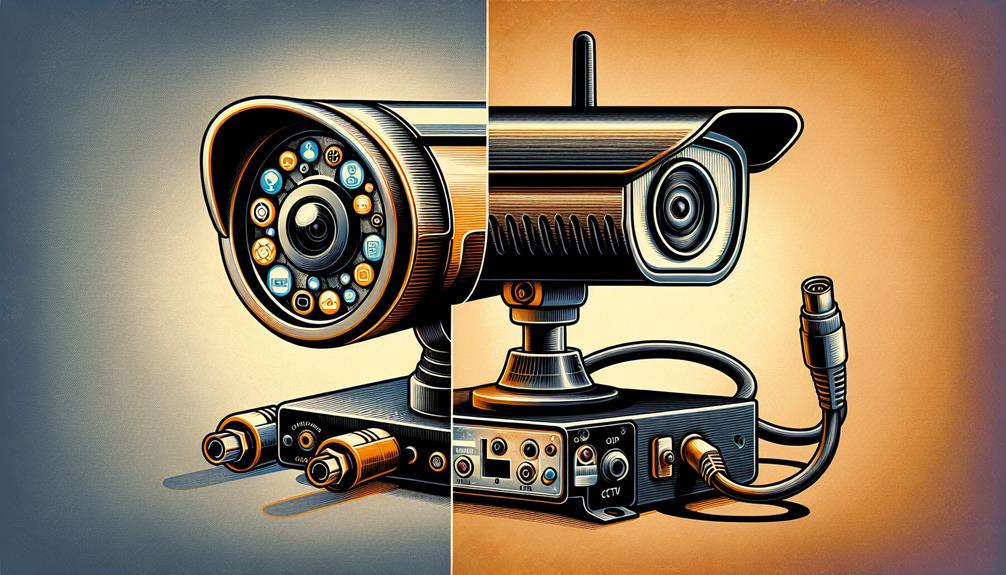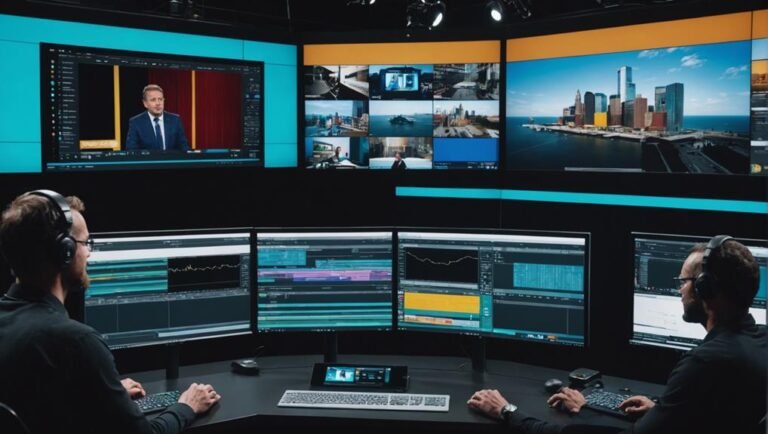When comparing IP CCTV cameras to analog cameras, you’ll see that IP cameras offer much higher image quality, with resolutions ranging from 2MP to 12MP. Installation is easier with IP cameras due to Power over Ethernet (PoE) technology, which requires just a single cable. They also enable convenient remote monitoring via smartphones or computers. IP systems are highly scalable, making it simple to expand your security setup. Although IP cameras have higher upfront costs, they save more in the long run through reduced need for upgrades and better features. Curious to learn more about why IP cameras might be the right choice for you?
Image Quality
When comparing image quality, IP CCTV cameras offer significantly higher resolution than their analog counterparts. You’re seeking freedom from grainy, unclear footage, and IP cameras deliver just that. With resolutions ranging from 2MP to even 12MP, you’ll capture every detail in stunning clarity. Analog cameras, on the other hand, usually max out at around 0.4MP, leaving much to be desired when scrutinizing footage.
Imagine having the ability to zoom in without losing clarity—IP cameras make that possible. You won’t have to squint or guess what you’re seeing. This is particularly useful for identifying faces, license plates, or any small details that might be important for security purposes. Analog cameras often leave you with blurry, pixelated images when you try to zoom in.
The freedom to monitor large areas with fewer cameras is another advantage. IP cameras cover more ground due to their higher resolution, meaning you’ll need fewer cameras to achieve extensive surveillance. This not only saves you money but also reduces the hassle of managing multiple camera feeds. So, if you value high-quality, detailed footage, IP CCTV cameras are unquestionably the way to go.
Installation Process
Switching gears from image quality, let’s talk about the installation process of IP CCTV cameras versus analog ones. When you’re gearing up to install an IP CCTV system, you’ll find it pretty straightforward. These cameras only need a single Ethernet cable for both power and data, thanks to Power over Ethernet (PoE) technology. That means fewer cables to worry about, giving you the freedom to set up your system without extra hassle.
On the flip side, installing analog cameras can be a bit more cumbersome. You’ll need separate cables for power and data, usually coaxial cables for video and an extra power supply line. This means more wires to manage and potentially a more complicated setup. If you’re looking to avoid drilling multiple holes or dealing with a tangled mess of cables, analog might not be your best bet.
Another freedom-enhancing feature of IP cameras is their ability to connect wirelessly. While not all models support this, many do, allowing you to place cameras in hard-to-reach areas without worrying about running long cables. Analog cameras don’t offer this flexibility, tying you down to more conventional setups.
Remote Monitoring
With IP CCTV cameras, you can easily monitor your property from anywhere using a smartphone or computer. Imagine you’re on a beach vacation, miles away from home. With just a few taps on your phone, you can check in and make sure everything’s secure. That’s the kind of freedom IP cameras offer.
These cameras connect to your network, allowing real-time access to live footage. Unlike analog systems, which require you to be physically present at a monitor, IP cameras give you the flexibility to be anywhere and still keep an eye on things. You can even receive instant alerts if the camera detects unusual activity, so you’re always in the loop without being tied down.
Setting up remote access is straightforward too. Most IP CCTV systems come with user-friendly apps and software. You won’t need to be a tech wizard to get it running. Just follow a few simple steps, and you’re good to go.
Ultimately, IP CCTV cameras empower you to live your life without constant worry. You get the peace of mind knowing you can always check in, no matter where you are.
Scalability
Beyond the convenience of remote monitoring, IP CCTV cameras also excel in scalability, allowing you to expand your security system effortlessly. When you need to add more cameras or enhance coverage, IP systems make it straightforward. You won’t be bogged down by the limitations that analog systems impose.
Here’s why IP CCTV is a game-changer for scalability:
- Network-Based Integration: IP cameras can be easily added to your existing network. You won’t need additional coaxial cables or complex setups. Just plug them into your network switch, and you’re good to go.
- High Resolution: With IP cameras, you can integrate high-resolution cameras without worrying about bandwidth limitations that typically plague analog systems. This guarantees you get better image quality, even when scaling up.
- Flexible Placement: IP cameras can be placed virtually anywhere within your network’s range, including remote or hard-to-reach areas. This flexibility allows you to cover more ground without the hassle of laying extensive cabling.
Cost Comparison
When it comes to cost comparison, you’ll find that IP CCTV cameras often have a higher upfront expense but can offer long-term savings. Initially, you’ll spend more on the cameras themselves, network infrastructure, and possibly even installation. However, these costs are counterbalanced by the advanced features and scalability IP cameras bring to the table.
Analog cameras, on the other hand, are typically cheaper upfront. The cameras and DVR systems come at a lower price point, making them an attractive option if you’re on a tight budget. But, don’t let the initial savings fool you. Analog systems often lack the flexibility and advanced features of IP cameras, which could mean higher costs down the road for upgrades and maintenance.
IP cameras integrate seamlessly with modern tech, reducing the need for frequent upgrades. They offer higher resolution and advanced features like remote access, which can save you money on physical security measures. Plus, with easier scalability, expanding your system won’t break the bank.
In contrast, analog systems can become costly as your needs grow. Upgrading or expanding often means replacing significant portions of your setup. So, while the initial price might be tempting, think about the future costs and the freedom that comes with a more adaptable system.
Frequently Asked Questions
How Does Weather Affect the Performance of IP and Analog CCTV Cameras?
Weather impacts camera performance by affecting visibility and equipment durability. Rain, snow, and fog can blur footage, while extreme temperatures might cause malfunctions. Choose weather-resistant models and guarantee proper installation to maintain effectiveness.
Are IP CCTV Cameras More Prone to Cybersecurity Threats Than Analog Cameras?
Yes, IP cameras are more prone to cybersecurity threats since they’re connected to the internet. Unlike analog cameras, hackers can target them remotely. You’ll need to implement strong security measures to protect your IP cameras.
How Does the Lifespan of IP Cameras Compare to That of Analog Cameras?
Imagine a candle burning longer and brighter. IP cameras, with their advanced technology and fewer moving parts, generally outlast analog cameras. You’ll enjoy more freedom from maintenance and replacements, keeping your surveillance smooth and trouble-free.
Can IP CCTV Cameras Integrate With Smart Home Systems?
Yes, you can integrate IP CCTV cameras with smart home systems effortlessly. They give you the freedom to monitor your home from anywhere, automate alerts, and sync with other smart devices for a seamless experience.
What Are the Power Requirements for IP Vs. Analog CCTV Cameras?
You’ll find IP cameras typically use Power over Ethernet (PoE), simplifying installation. Analog cameras need separate power sources. IP setups give you more freedom with fewer cables, while analog setups might feel restrictive with extra wiring.



